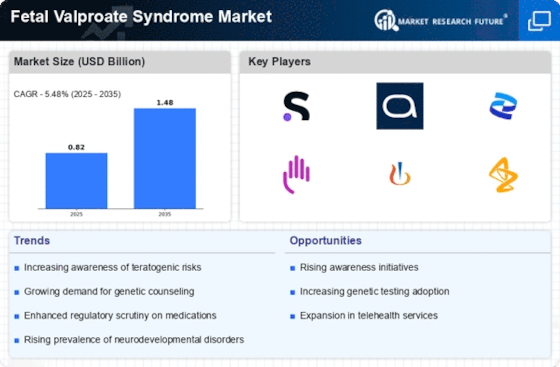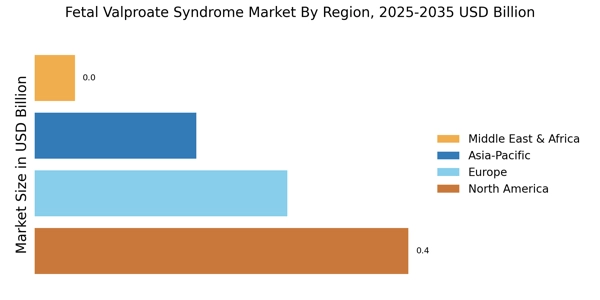Rising Demand for Support Services
The rising demand for support services for families affected by Fetal Valproate Syndrome Market is a significant driver in the Fetal Valproate Syndrome Market. As awareness of the syndrome increases, families are seeking comprehensive support systems that address both medical and emotional needs. This includes access to counseling, educational resources, and community support networks. The growing recognition of the challenges faced by families has led to the establishment of various organizations and initiatives aimed at providing assistance. As these support services become more prevalent, the Fetal Valproate Syndrome Market is likely to expand, with stakeholders investing in resources that enhance the quality of life for affected individuals and their families.
Growing Research on Long-term Effects
Growing research on the long-term effects of Fetal Valproate Syndrome Market is contributing to the expansion of the Fetal Valproate Syndrome Market. As studies continue to explore the developmental and psychological impacts of the syndrome on affected individuals, there is an increasing need for tailored therapeutic approaches and support systems. This research not only enhances understanding of the condition but also informs clinical practices and policy-making. The insights gained from ongoing studies are likely to drive demand for specialized services, including educational programs and psychological support for families. Consequently, the Fetal Valproate Syndrome Market may experience growth as stakeholders seek to address the complex needs of those affected.
Advancements in Diagnostic Technologies
Advancements in diagnostic technologies are significantly influencing the Fetal Valproate Syndrome Market. The development of more accurate and efficient diagnostic tools has enabled earlier detection of the syndrome, which is crucial for timely intervention and management. Innovations such as genetic testing and advanced imaging techniques are becoming increasingly accessible, allowing healthcare providers to identify affected individuals more effectively. This surge in diagnostic capabilities is likely to lead to an increase in reported cases, further driving the demand for specialized treatments and support services. Consequently, the Fetal Valproate Syndrome Market is expected to witness growth as healthcare facilities invest in these advanced technologies to enhance patient outcomes.
Increased Focus on Maternal Health Policies
The increased focus on maternal health policies is emerging as a key driver in the Fetal Valproate Syndrome Market. Governments and health organizations are recognizing the importance of safeguarding maternal and fetal health, leading to the implementation of stricter regulations regarding the prescription of valproate medications during pregnancy. This shift in policy aims to reduce the incidence of Fetal Valproate Syndrome Market and promote safer alternatives for managing epilepsy and other conditions in pregnant women. As these policies take effect, there is likely to be a corresponding rise in demand for educational resources and support services for both healthcare providers and patients. This evolving landscape may create new opportunities for stakeholders within the Fetal Valproate Syndrome Market.
Rising Incidence of Fetal Valproate Syndrome
The increasing incidence of Fetal Valproate Syndrome Market is a notable driver in the Fetal Valproate Syndrome Market. Recent studies indicate that the prevalence of this condition has been on the rise, attributed to the widespread use of valproate medications during pregnancy. This trend has prompted healthcare professionals to pay closer attention to the risks associated with valproate exposure, leading to heightened awareness among expectant mothers and healthcare providers. As a result, there is a growing demand for diagnostic tools and therapeutic interventions aimed at managing the syndrome. The market is likely to expand as more healthcare systems recognize the need for specialized care and support for affected families, thereby driving investment in research and development within the Fetal Valproate Syndrome Market.

















